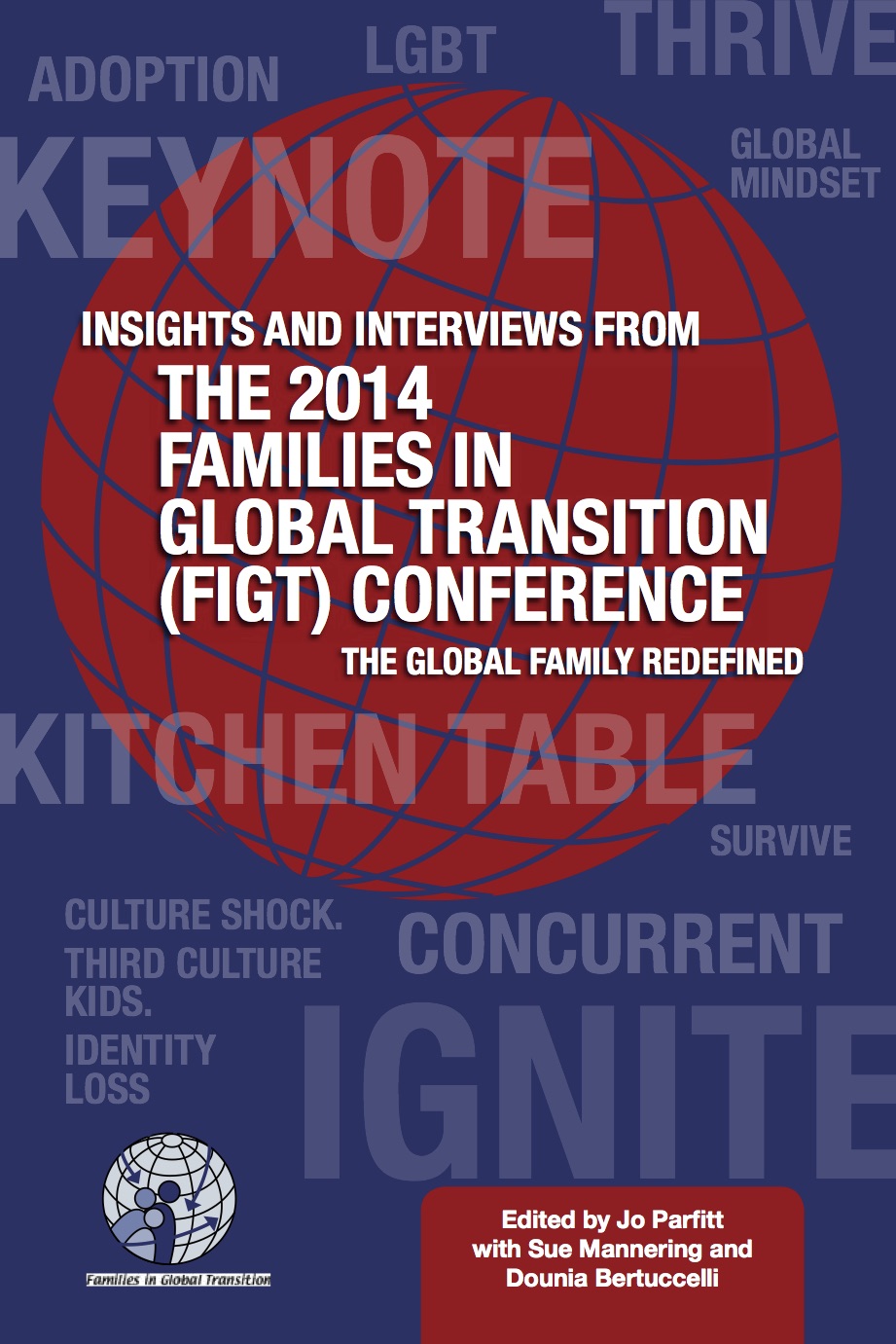
This is the first in a series of excerpts from the soon to be published first FIGT Yearbook
Insights and Interviews from the 2014 Families in Global Transition (FIGT) Conference
The Global Family Redefined
IGNITE SESSION Led by Julia Simens
By Terry Anne Wilson
“My home is a plane that drops me into new places.” This statement by Julia Simens resonated with the audience as she discussed the nannies, cooks, drivers and security staff that become part of those overseas homes. Understandably, these ‘beloved strangers’ become part of our family yet are left behind as we transition, often having a lasting impact on them and our children. Julia is a family therapist and educator who has helped countless families transition globally. She draws on personal experience as well as poignant perspectives from families, especially children. The term Beloved Stranger was coined by FIGT two-time attendee, Eva László-Herbert, who had suggested a session on this important subject. Unfortunately, she was unable to attend the conference and the idea was deemed so important that Julia took over the task of conducting the session. She was the perfect choice, her heartfelt message brought tears to many in the audience.
Two important issues were raised.
Impact on Children and Staff
“We need to look beyond dinner parties, pressed t-shirts and daily cleaned floors,” Julia reminds us. She elaborates that the relationship we have with these ‘beloved strangers’ who help facilitate a certain lifestyle, can be powerful and passionate. Children can have a close relationship with these caregivers, in fact they’re often more interested in them than are the adults themselves. Kids can rattle off their names, for example, while parents may only know the man they entrust the safety of their children with as ‘driver’. In her counseling, Julia has often noticed that kids will draw family pictures with their hired help included, yet that is a term children are often reluctant to use.
When her son was young for example, he had the wisdom to realize that these ‘beloved strangers’ are not defined by a job title, but by the individual people they are. He refused to use the word ‘servant’ Proof that in the eyes of a young child they can become family members, especially since extended
family isn’t nearby. In fact, Grant Simens, aged about 4, drew a picture of his family, coloring his blood family in bright colors, but the domestic helpers in pencil. A sharp intake of breath filled the room when this was shown.
Considering the time spent together and commitment shown by many staff, close bonds are understandable. That bond can reveal itself in different ways such as a child late at night wanting to speak the language he had learned from his nanny, as was occasionally the case with Julia’s son, Grant. What a wonderful gift to have received from a loving caregiver, that of language. Undoubtedly fond memories are evoked to this day when that language is heard. My youngest son for example, was fiercely protective of certain things only Gina, our nanny, could do for him. One of them being having his ears cleaned. Only his beloved Gina, was allowed anywhere near him with a Q-tip; the mention of it still brings a smile after all these years. He was only six months old when we welcomed her into our home in Doha, Qatar. Having left behind a one-year-old in the Philippines, one of her four children, we can only imagine how wrenching this would be and the sacrifice it is to leave your own young family behind, to care for another. All the more reason to treat staff with care and “consider them part of our team,” Julia stresses.
Recognition and Appreciation
Treat staff with respect and appreciate their service, we are reminded. Ju- lia points out that just as they ‘visit our world’, we must offer them the same consideration and some appreciation of their background. This can be celebrations of their culture and food, such as a recipe. Many families depart with favorites their nanny or cook spoiled their children with, only to find we’ll never prepare it quite as well as they did. My butter chicken is a sorry substitute for the delicious rendition our houseboy in Oman would spoil us with!
Appreciation can be shown in more substantial ways of course, such as providing additional flights home or a course to better their career options. I know a family who continued to provide for the education of their staff’s children, long after employment had ended. All these are fine examples of acknowledgement and being in a position to act upon it.
If a family has developed a close relationship with staff, it’s important to retain that once you relocate or to rekindle those relationships if contact has been lost. Julia recommends ensuring they have a photo of themselves with the children and with today’s social media, it’s easier to stay in touch and reconnect. We recently did just that with our beloved Gina, and my three sons are still hers, she happily reminds us on Facebook, and it is special to have her in our lives again. As Julia rightfully says, “the hardest part of living is that nothing lasts forever.” True indeed, but we can do our best to ensure these ‘beloved strangers’ are appreciated for the role they’ve played in our families’ lives.

